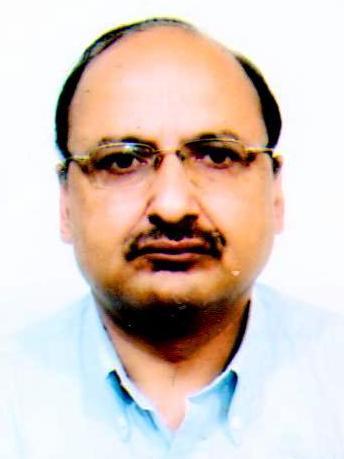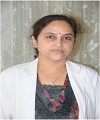Principal Investigator’s
|
“Research Theme”
|
Dr. Bidita Khandelwal, MD.
Associate Dean Research,
Professor & HOD Medicine,
SMIMS |
Dr. B. Khandelwal acts as the current Associate Dean Research at SMIMS, SMU. Dr. Khandelwal has 20 years of experiences in academic leadership, clinical practices and research. The notable achievements include start of 1ST Dialysis unit in the state of Sikkim with 7 hemodialysis machines for managing patients with end stage renal diseases. Dr. Khandelwal was further awarded certificate of exemplary contribution by Sikkim Manipal University for exemplary work relating to academic programme implementation, health care and patient services in 2008 by Shri N R Narayana Murthy, co-founder of Infosys. Dr. Khandelwal more than 40 published papers in her main research area particularly focused on inflammation in diabetes mellitus, diabetic nephropathy, cardio-vascular stroke, and patient care. Dr. Khandelwal has also received 12 major extramural funding for her research studies, where she has been either the main principal investigator or a co-investigator. Additionally Dr. Khandelwal acts as a supervisor and a co-supervisor for many M.D and Ph.D students at SMIMS. |
Dr. T. Shantikumar Singh, MD.
Professor & HOD, Microbiology, SMIMS
|
The main focus of Professor Singh's lab is to understand the morphological and molecular mechanisms behind parasitic infections. The areas of his research expertise are as follows:
• Development of a rapid serological test kit for identification of Paragonimus species of parasite, which is endemic in northeast states of India, as no rapid serological test for diagnosis of paragonimiasis is available in India.
• In search of novel antimicrobial agent against Staphylococcus aureus and Vibrio cholera, we are proposing Silibinin, a natural compound found in the herb milk thistle, common know as “Dudhi” in Hindi and “Khomthokpi” in the North East India. Silibinin, targets bacterial cell division protein FtsZ, thus our objective is to investigate whether Silibinin can inhibit the growth of theses pathogenic strains, by targeting FtsZ. Based on this research background Professor Shantikumar Singh also actively supervise many Ph.D and M.D students. |
Dr. T Amamacha Singh, MD. Professor & HOD Biochemistry,
SMIMS
|
Professor T Amumacha Singh, established the Biotech Hubs in SMIMS as a part of the North Eastern state initatives by DBT, India. The Biotech Hub Scheme was initiated during the year 2010-11 with the broad purpose of promotion of education and research in biology, life science or biotechnology. Thereafter, the lab actively fosters studies on stem cell research, DNA damage, markers for cartilage disorders and diseases. Professor Singh has supervised and co-supervised many M.D and Ph. D students. On 2015, Professor Singh was awarded “Jewel of India Award” for outstanding achievement in the development of biotechnology hub in Sikkim by the Indian Solidarity Council. |
Dr. D.K. Jha, MD
Professor & HOD Physiology, SMIMS
|
Professor Jha's research interests are as follows:
· To investigate, the relationship between obesity and respiratory symptoms such as breathlessness without any respiratory disease. In Sikkim particularly, consumption of junk food tends to act as one of the most important factor behind obesity and the efficacy of this is seen in relation to the respiratory functions.
· Another significant problem that the inhabitants of Sikkim face is its location at a higher altitude which causes the RBC count to increase leading to rise in blood pressure. Thus, the changes and variation in the systemic arterial blood pressure and haematological parameters have a profound influence in overweight and obese person and my research focuses on exploring this physiological factor.
|
Dr Yogesh Verma, MD. Professor Pathology,
SMIMS
|
Professor Verma foucses on extended follow-up of the participants of IARC-India HPV vaccination and evaluates the effectiveness of one, two and three doses of quadrivalent HPV vaccine in preventing cervical neoplasia. The main objectives of Professor Verma's research are as follows: Objective 1: Generate scientific evidence on the clinical efficacy of single and 2 - dose HPV vaccination regimen against virological and disease end - points in adolescent and young adult girls.
Objective 2: Evaluation of performance of HPV testing followed by triaging with cytology techniques to screen the vaccinated women.
|
| Dr. Mingma L Sherpa, MD. Professor Biochemistry, SMIMS
|
Cervical cancer, is the second most common preventable cancer among Indian women and the fourth common cancer among women worldwide. 200 types of HPVs known till date and15 high risk HPV types have been associated with cervical and anogenital cancers. HPV strains exhibit regional variation, and recent introduction of two HPV vaccines for young girls, Gardasil (16/18/6/11) and Cervarix (16/18) it is important to have HPV prevalence data in women and adolescents from North-East region of India. Dr. Mingma's research lab, assess the HPV infection status and genotypes among women and adolescent girls of Sikkim and correlate the clinic-epidemiological and demographic variables with HPV prevalence for the first time in the North-eastern region. |
Dr. Nikita Joshi Sonowal,
Professor & HOD, Sikkim Manipal College of Physiotherapy (SMICOP)
|
"Evaluation of functional impairments in geriatric population of Sikkim.”
The objectives of Professor Sonowal research is :
1) To find out the functional impairments among the elderly population of Sikkim and
2) To quantify activity limitation of the elderly having functional impairments.
Important of this research:
Sikkim with 6.7% of the total geriatric population and around 75.03% of the population living in rural areas has a steadily increasing geriatric populations. The land terrain is steep, hilly and contributes to a lot of problem in t daily activities of living for the elderly. Presently there is no comprehensive evidence that has evaluated the functional impairments in Sikkim. Thus, the main focus of my research lab is to provide a better insight about the functional disability of elderly and enhance the government and policy makers for forming a comprehensive geriatric rehabilitation services. |
Dr. Soumyajit Das
Associate Professor, ENT,
SMIMS |
Iron is an essential nutrient for the developing brain and perinatal iron deficiency has been found to have long lasting cognitive and behavioural outcomes. Ferritin is a reliable indicator of tissue iron stores and as such umbilical cord ferritin has been found to correlate with the fetal iron stores during pregnancy. BERA (Brain stem evoked auditory responses) is an objective measurement of the integrity of the auditory pathway. Thus, the objective of Dr. Das research is to look into the relation of cord blood ferritin level and BERA threshold of the newborn and study the effect of cord blood ferritin level on latency and amplitude of BERA waves. |
Dr. Polly Lama, Ph. D
Associate Professor, Anatomy, SMIMS
|
Cartilage injuries and disorders affect millions of people worldwide. It is characterized by microarchitectural deterioration of the tissue, cells and extracellular matrix that leads to progressive degenerative changes, vicious cycle of chronic inflammatory responses, and is more severe following age-related injuries and diseases. Cartilage tissues are considered to be irreversible to heal, and this is due to lack of understanding of the events that lies behind pathogenesis of cartilage degeneration, resulting in ineffective treatment strategies for clinical use. Consequently, there is an unmet need to improve our understanding of irreversible healing process in cartilage tissues. Thus, the main focus of Dr. Lama’s research is to investigate the following: -
· Pathogenesis of disc degeneration and to analyze the healing potential of degenerated intervertebral discs
· To identify, molecular mechanisms behind intervertebral disc cell cluster formations and its relevance behind repair
· To sought, the role of “alarmins” in degeneration and pain in articular cartilages
|
Dr. Arundhati Bag, Ph. D.
Assistant Professor,
Medical Biotechnology, SMIMS
|
Diabetic nephropathy, is the most common cause of end stage renal disease (ESRD). Early identification of this chronic complication is of utmost importance for its management. The goal of my research is therefore to identify sensitive and specific biomarker(s) that can predict a patient’s susceptibility to diabetic nephropathy. |
Dr. Karma Gurmey Dolma, Ph.D
Associate Professor, Microbiology, SMIMS
|
Multi-drug resistant tuberculosis (MDR-TB) suspects in northeast region of India are found in the range of 30%. Among the north-eastern states, namely Arunachal Pradesh, Sikkim and Meghalaya have reported MDR-TB in the range of 10-23%. The Northeast states of India have many specific issues related to TB, which make the control program implementation challenging in these areas. One of the important methods of controlling the spread of MDR-TB is to identify the regions with high disease transmission leading to hotspots. Various traditional typing methods have been tried including spoligotyping, MIRU-VNTR typing but all these methods have limitations such as poor discriminatory power due to very low percentage of genome sampled using typing methods (in the order of 1%). Whole genome sequencing (WGS), which samples the complete genome, can overcome such issues largely. Overall, my study aims to define the hotpots of MDR-TB in the north-eastern states and identify the transmission of primary MDR-TB in these regions. Therefore, Dr. Gurmey’s Lab's focuses on the following objectives:
• To employ, whole genome sequencing and traditional genotyping for mapping hotspots of Primary MDR-TB in Assam, Tripura and Sikkim.
• To identify transmission patterns and source/s of MDR-TB using molecular epidemiology and clinical epidemiology.
• Creation/Improvisation of infrastructural facility in North East Region of India for early diagnosis of MDR-TB |







